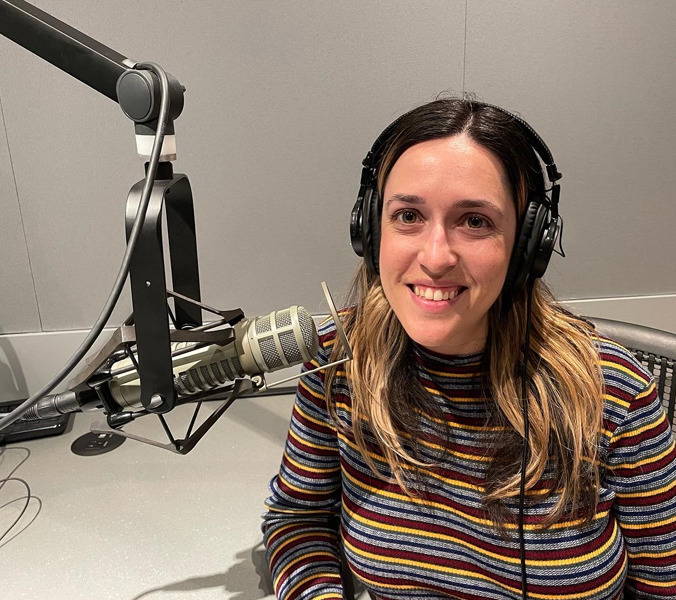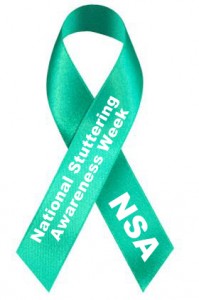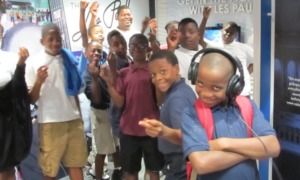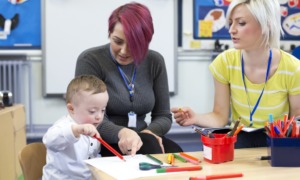 While I am now proud of my stutter and embrace this part of my identity in a public way through podcasting, growing up with a stutter was a very isolating experience, especially at school. Because I didn’t know anyone else that had a stutter, I felt extremely misunderstood by my peers and teachers. I would get notes on my report card about my lack of preparation on my presentations and my underperformance in class participation. I was consistently labeled by my teachers and schoolmates as the shy one even though deep down I wanted to be the class clown and participate openly. But my fear of getting found out as a stutterer always was present. For a time, I would rather my grades suffer than for my classmates to find out I had a speech deficiency.
While I am now proud of my stutter and embrace this part of my identity in a public way through podcasting, growing up with a stutter was a very isolating experience, especially at school. Because I didn’t know anyone else that had a stutter, I felt extremely misunderstood by my peers and teachers. I would get notes on my report card about my lack of preparation on my presentations and my underperformance in class participation. I was consistently labeled by my teachers and schoolmates as the shy one even though deep down I wanted to be the class clown and participate openly. But my fear of getting found out as a stutterer always was present. For a time, I would rather my grades suffer than for my classmates to find out I had a speech deficiency.

Chloe Veltman/Courtesy of Maya Chupkov
Maya Chupkov, a woman who stutters, is the creator, producer, and host of “Proud Stutter,” a podcast about shifting the narrative around stuttering.
Life outside the classroom was even worse. I felt exhausted after the days my brain worked extra hard to hide my stutter. For the times that my stutter would slip out, I would get made fun of by bullies and even by my teachers. The pain of living with a stutter in my youth is not something I would wish upon anyone.
And yet, there are hundreds of thousands of children who stutter and likely feel the same way. According to the Stuttering Foundation, about 5 percent of all children go through a period of stuttering that lasts six months or more. Three-quarters of those will lose their stutter by late childhood, leaving about 1 percent that will carry it with them through adulthood.
I did find solace in extracurricular activities. Playing competitive volleyball in middle school and joining the show choir in high school gave me a sense of purpose and community. However, I did let my stutter get in the way of accepting my school’s broadcast journalism reporter role. I also decided not to join the debate team because I didn’t want my stutter to be the reason my team lost.
Using popular culture to spread awareness around stuttering
There is a growing movement to spread awareness around stuttering inside and outside the classroom. Filmmaker John Gomez, director of the award-winning documentary “When I Stutter,” consulted on a Netflix show called “Maya and the Three.” It’s about three legendary fighters hoping to save the world of gods and humankind. One of “the three” companions is a character called Rico, who has a stutter. Instead of his stutter being portrayed as a hindrance, it makes him a better wizard.
Another medium that is literally lifting up the voices of the stuttering community is podcasting. There are several podcasts around stuttering that are helping raise awareness about the disability, including my own show that I host and produce called “Proud Stutter,” William Laven’s “Stammer Stories,” and Priya’s “StutterConversation.” What makes podcasts so powerful and healing for people who stutter is it allows us to be freely ourselves in an intimate setting. These shows also allow people who do not stutter become more familiar with the diverseness of speech that they may encounter in their daily lives. Podcasts are also accessible and free for the public to listen to in the comfort of their own spaces. And from an educational standpoint, they can even be a powerful way to help parents understand their kids living with a stutter.
I created the show because I want to shift the narrative around stuttering away from treating it as something to be cured and to something to be embraced. I also want to help people who stutter, especially young people, feel less alone. I wish I had something like “Proud Stutter” when I was a teen.
Stuttering advocacy inside and outside the classroom
 Proud Stutter and other podcasts hosted by people who stutter are shifting the narrative around stuttering. My vision for my own show is to create opportunities for listeners to advocate on behalf of themselves and the broader stuttering community.
Proud Stutter and other podcasts hosted by people who stutter are shifting the narrative around stuttering. My vision for my own show is to create opportunities for listeners to advocate on behalf of themselves and the broader stuttering community.
My first goal is to get as many U.S. cities as possible to pass local resolutions recognizing National Stuttering Awareness Week in their communities. I’m starting by getting my own city, San Francisco, on board. With help from the stuttering community living in the San Francisco Bay Area, the San Francisco Board of Supervisors is expected to pass a resolution that will formally recognize the second week of May as National Stuttering Awareness Week annually. While the goal is to spread more awareness about stuttering in my own community broadly, I am hoping this will extend to San Francisco’s school district and prompt teachers and administrators to lift this holiday up in schools across the city.
Becoming a better ally for young people who stutter
When you are interacting with a young person who stutters, it’s important to know what to do (and what not to do) to support their success and create a space that is understanding, kind, and patient. Here are some strategies to consider:
• Be aware of your facial expressions and nonverbal cues. When I was in school, I was extremely sensitive to the facial expressions I would receive when stuttering. Try to keep your face and body neutral and in a way that shows unconditional listening.
• Never finish sentences or say phrases like, “slow down, “breath” or “start over.” This can be triggering because it sends a message of disapproval.
• Participating in stuttering holidays like National Stuttering Awareness Week (second week of May) and International Stuttering Awareness Day (October 22) can be a great way to engage with the stuttering community and practice strong allyship.
———
Maya Chupkov, a woman who stutters, is the creator, producer, and host of “Proud Stutter,” a podcast about shifting the narrative around stuttering. Maya has been featured on NPR, Accessibility.com and Poytner, among others. In her day job, Maya is the Media & Democracy program manager for California Common Cause.
































